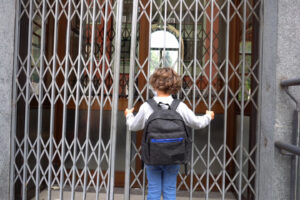More millennial parents question ‘gentle parenting’
An increasing number of millennials are speaking out against “gentle parenting,” saying it sets impossibly high standards for parents while hurting children’s overall preparation for real…

An increasing number of millennials are speaking out against “gentle parenting,” saying it sets impossibly high standards for parents while hurting children’s overall preparation for real life.
“Gentle parenting is way too gentle,” writes Hannah Nwoko for Business Insider. “Children need to learn that the world doesn’t revolve around their personal feelings. Children need a level of firmness and accountability.”
Such criticisms were scarcely to be found online just a few years ago, when many articles touted gentle parenting as an improvement over previous generations’ attempts to raise children.
“Proponents of gentle parenting say it produces securely attached kids who are self-possessed, emotionally attuned, and kind – claims that seem to be supported by developmental-psychology research,” writes journalist Kelli María Korducki. “But in practice, the parental authority required to make the approach work often flees the scene. Too often, gentle parenting gives way to leniency and overindulgence.”
Online, social media factors pushing popularity
Nwoko’s June article demonstrates a major departure from another Business Insider article in 2021, where Chrissy Horton praised gentle parenting as “something I know they’ll benefit from once they’re on their own in the world.”
“Gentle parenting allows the child to participate in the decision-making process and learn through natural consequences, rather than rigid ones imposed by their parents,” the former preschool teacher wrote. “It focuses more on the need or issue in which their behavior is rooted, instead of disregarding their perspective. It helps children develop the tools needed to regulate their emotions and control their behavior.”
However, focusing just on the child’s feelings can leave parents without clear direction for specific behaviors, Korducki noted.
“The open-ended guidelines laid out by gentle-parenting authors and influencers don’t always make hard behavioral limits easy to outline or enforce. A crowded arena of parenting experts and influencers – such as Instagram’s ‘Dr. Becky’ Kennedy and an endless supply of TikTokers – bring their own strategies and buzzwords into the mix, which can exacerbate confusion.”
One factor in the rise of gentle parenting’s popularity involved the use of online searches and social media.
For example, Ian MacAllen began searching Google for more information after seeing Instagram reels while watching his 1-year-old son.
“As an older millennial, I wasn’t tuned into parenting TikTok and my Instagram algorithm was more likely to show me videos of trendy restaurants than offer parenting advice,” he writes.
“I have raised my voice. I have even yelled. But only rarely. I wear eyeglasses, and with an astigmatism and high prescription, I’m nearly blind without them. These facts haven’t prevented my toddler from knocking the glasses off my face, sometimes intentionally. He broke two pairs, even after having conversations about why he shouldn’t touch my glasses.”
‘Ongoing tug of war’
MacAllen’s experience mirrored Nwoko’s in finding conversations alone failed to change her child’s behavior.
“As my son approached preschool age, it became apparent that he would struggle in school – and the real world – if I didn’t change my approach to parenting,” she wrote.
“His tantrums would go on for too long, he would be defiant with everyday tasks, and he would struggle to recognize authority. Even when I followed the gentle parenting scripts laid out by gurus, everything felt like an ongoing tug of war.”
Nwoko cited a recent study where 40% of adults interviewed described gentle parenting as overwhelming and exhausting.
“I could no longer align myself with the parental restrictiveness of the movement. I felt like I was treading on eggshells all the time. The pressure to be the perfect, patient parent was wearing me down.”
For Nwoko, one factor helping her change her view involved seeing other people’s responses on social media to challenges such as getting her son to brush his teeth.
“Instead of seeing rational responses, I was shocked to find some parents suggesting to avoid brushing teeth to keep children happy while defining it as ‘negotiable,’” she wrote. “This seemed unacceptable to me.”
Such tactics also require a high level of parental involvement, which can hinder children’s development toward independence and self-reliance, according to Korducki.
“Research recently published in The Journal of Pediatrics found that a decadeslong trend toward high parental involvement — and, specifically, the diminished childhood independence that can result from it — neatly tracked with rising rates of depression and anxiety in children and teens, which have reached a record high.”
Furthermore, permissive parenting has been linked in research to “high levels of aggressiveness, antisocial behavior problems, and lack of self-discipline,” Korducki explains.
‘So afraid of traumatizing my son’
Ironically, many Millennials began gentle parenting to avoid aggression in their children and counter previous child-raising styles, which they viewed as too disciplinary.
“As a millennial mom, I’ve always had this fantasy of raising my child as my friend – being the ‘cool mom’ was absolutely my dream,” Nwoko wrote. “I was so afraid of traumatizing my son by being too firm and imposing too many rules.”
While she was pregnant, Nwoko researched parenting styles and ultimately decided on this “ultramodern movement” to help her reach her goals.
“It promised a deep bond between parent and child, with a strong focus on the child’s feelings. It leaned more toward giving children choices instead of orders. Importantly, it frowned upon punitive tactics. It perfectly aligned with what I wanted from motherhood – peacefulness – or so I thought.”
Before her son reached preschool age, Nwoko tried to implement this method to the best of her abilities.
“I managed to avoid using the word ‘no,’ I didn’t implement time-outs, and if my son really didn’t want to do something, instead of being reactive, I would exercise a level of patience and graciousness that previous generations probably wouldn’t have. I always tried my best to model a sense of calmness by giving my son a safe space to experience his negative emotions. This seemed like a fundamental aspect of gentle parenting.”
However, Nwoko soon discovered this approach hindered her ability to be “adaptable” to her son’s changing moods and situations.
“I quickly realized that every child has varying levels of noncompliance, and in order for my son to assimilate well outside the home, he couldn’t keep up with his behavior (which I had admittedly enabled).”
Nwoko now encourages parents to evaluate their child’s specific needs instead of trying to conform to preconceived directions from social media influencers and gurus.
“Drifting away from gentle parenting made me realize that parenting is more about trusting your gut than following scripts and best practices. I’ve learned to be myself and foster a healthy mother-son relationship with my child by enforcing firm limits and expectations while always giving warmth and support.”



